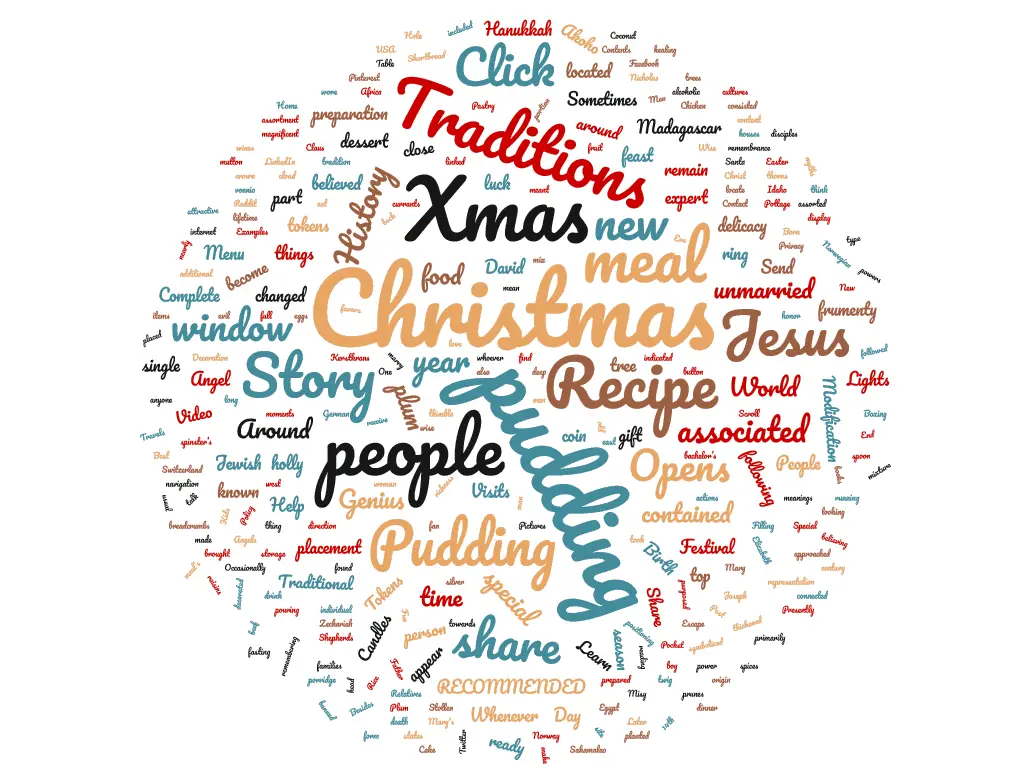Presently, what people think of Christmas pudding as, is not what it primarily was.
With its origin in the 14th century, the meal consisted of a type of porridge known as; ‘frumenty.’
It contained an assorted mixture of beef, mutton, prunes, currants, wines, raisins, and spices.
After its full preparation (recipe of Christmas Pudding), the combination would appear a thick soup-like meal.
This traditional food associated with the British Christmas ceremonial dinner. The people then took the pudding as a form of fasting, and towards getting ready for the Christmas celebrations.
While the pudding connected to the Christmas season, some cultures associated it with the Easter season.
During this time, people decorated the top part of the dessert with the attractive twig of the holly tree.
It symbolized a remembrance of the crown of thorns that Jesus wore on his head when it nearly approached his death.
Occasionally, there was the pouring of an alcoholic drink over the pudding to make a magnificent display.
Its representation was that of the love and power of Jesus. Besides, people associated the holly tree with such special moments of remembering Jesus.
They planted them close to their houses, believing that the trees contained healing powers and brought luck to families.
Modification of the Pudding
Later around 1595, people made an assortment on to the pudding. They thickened it with breadcrumbs, eggs, and dried fruit.
The frumenty received a better flavor, and its name changed to ‘plum pudding.’ The valued meal had the accompaniment of spirits and beer.
Many people embraced this Tradition, and by the year 1650, the plum pudding became a habitual Christmas dessert.
However, in 1664, the Puritans presented the meal as an evil custom and therefore banned it.
Sometime later, King George, I tasted the plum pudding and enjoyed the delicacy. In 1714, he reformed it as part of the Christmas food.
People continued to value this special meal for a long time. The pudding then changed around Victorian times to become something close to what people eat today.
By then, the rich would prepare the Christmas pudding to appear jelly-like.
The ready meal formed the shapes of castles or towers. Conversely, ordinary people had their pudding as ball-shaped.
Whenever the meal was heavier than usual, people referred to it as, ‘cannonball.’
Over time, various myths surrounded the Christmas pudding. One myth states that the meal’s preparation should include thirteen different ingredients.
This factor represents Jesus and his twelve disciples.
The superstition further adds that every family member present in the Christmas celebration should mix the pudding from the east to the west direction using a wooden spoon.
All these actions purposed to honor the wise men.
Christmas Pudding Tokens
An old tradition linked to the meal by then was the placement of a silver coin deep into the prepared food.
People believed that, during the feast, whoever found the coin in their pudding portion would receive some luck.
Sometimes, there were additional items known as, ‘favors’ or ‘tokens,’ placed in the delicacy, which contained special meanings.

Examples of such Christmas pudding tokens included:
- A ring placement in the pudding- If an unmarried individual would locate it; the people believed that the person would marry in the following year. They also associated the ring with richness, for anyone who could find it during the Christmas pudding feast.
- Sometimes there would be the positioning of the spinster’s thimble in the pudding. Whenever a single woman located it, it meant that they would remain unmarried in the year that followed.
- A bachelor’s button located in the pudding by an unmarried man indicated that they would remain single in the following year.
Learn More With the Help of Video
Conclusion
Christmas pudding is always a part of the Christmas menu all over the world. The tradition of adding it to the menu is centuries old.
In fact, the tradition of Christmas pudding was started in the 14th century. In this article, I have shared the complete history of how pudding came into existence and what all other traditions are related to it.
Word Cloud for History of Christmas Pudding
The following is a collection of the most used terms in this article on History of Christmas Pudding. This should help in recalling related terms as used in this article at a later stage for you.

- https://en.wikipedia.org/wiki/Christmas_pudding
- https://www.history.com/news/the-holiday-history-of-christmas-pudding
- https://www.englishteastore.com/history-of-christmas-pudding.html

The rich history and evolution of Christmas pudding is truly a testament to the enduring traditions of the holiday season.
The concept of Christmas pudding tokens is so intriguing, it’s like a treasure hunt at every holiday feast.
Absolutely, it adds an element of fun and surprise to the celebration, an old tradition worth keeping alive!
I find it funny how the Puritans initially banned Christmas pudding, only for King George I to reinstate it later. Quite the shift in perception!
Indeed, it’s an interesting example of how traditions can be subject to changing attitudes and beliefs.
The richness of history and tradition behind Christmas pudding makes each festive season all the more meaningful and special.
The evolution of Christmas pudding through the ages is a true reflection of the evolving tapestry of human culture and traditions.
Absolutely, it’s like sharing a taste of history with every Christmas pudding serving!
The myths and superstitions surrounding Christmas pudding are so intriguing, adds an air of mystery and magic to the holiday festivities.
Absolutely, it’s like a blend of history, religion, and folklore all rolled into one delicious dessert!
It’s like Christmas pudding is a living, edible piece of cultural heritage, filled with stories and traditions.
It’s crazy to think that Christmas pudding was once considered a form of fasting. I’m amazed at the transformation it went through over the centuries!
I know, it’s such an interesting historical journey for a dessert that is now a key part of Christmas traditions.
The shift from frumenty to plum pudding is quite a story on its own, so much rich history behind this dish.
The history of Christmas pudding is a reminder of how deeply rooted traditions can be, connecting generations and cultures over time.
A delicious slice of history with every bite, Christmas pudding truly embodies the spirit of the holiday season.
Absolutely, it’s a testament to the enduring power of tradition and the importance of preserving cultural heritage.
The history of Christmas pudding is so fascinating! I had no idea about the origins and all the traditions associated with it. Definitely makes me appreciate this holiday treat more.
I agree, learning about the background of Christmas pudding adds a whole new layer of meaning to it!
I find it so interesting that the traditions surrounding Christmas pudding have evolved over time, very informative article!
I never knew about the symbolism behind the decorations on Christmas pudding, very insightful to learn about the cultural and religious significance.
Yes, the link between the holly tree and religious symbolism is quite remarkable, adds a deeper dimension to the pudding tradition.
It’s amazing how much history and tradition is packed into something as simple as a Christmas pudding.
The idea of placing a silver coin or other items in the pudding is a fun and unique tradition, adds a sense of excitement and anticipation to the meal.
Agreed, it’s like a little bit of magic and mystery hidden in every slice of Christmas pudding!